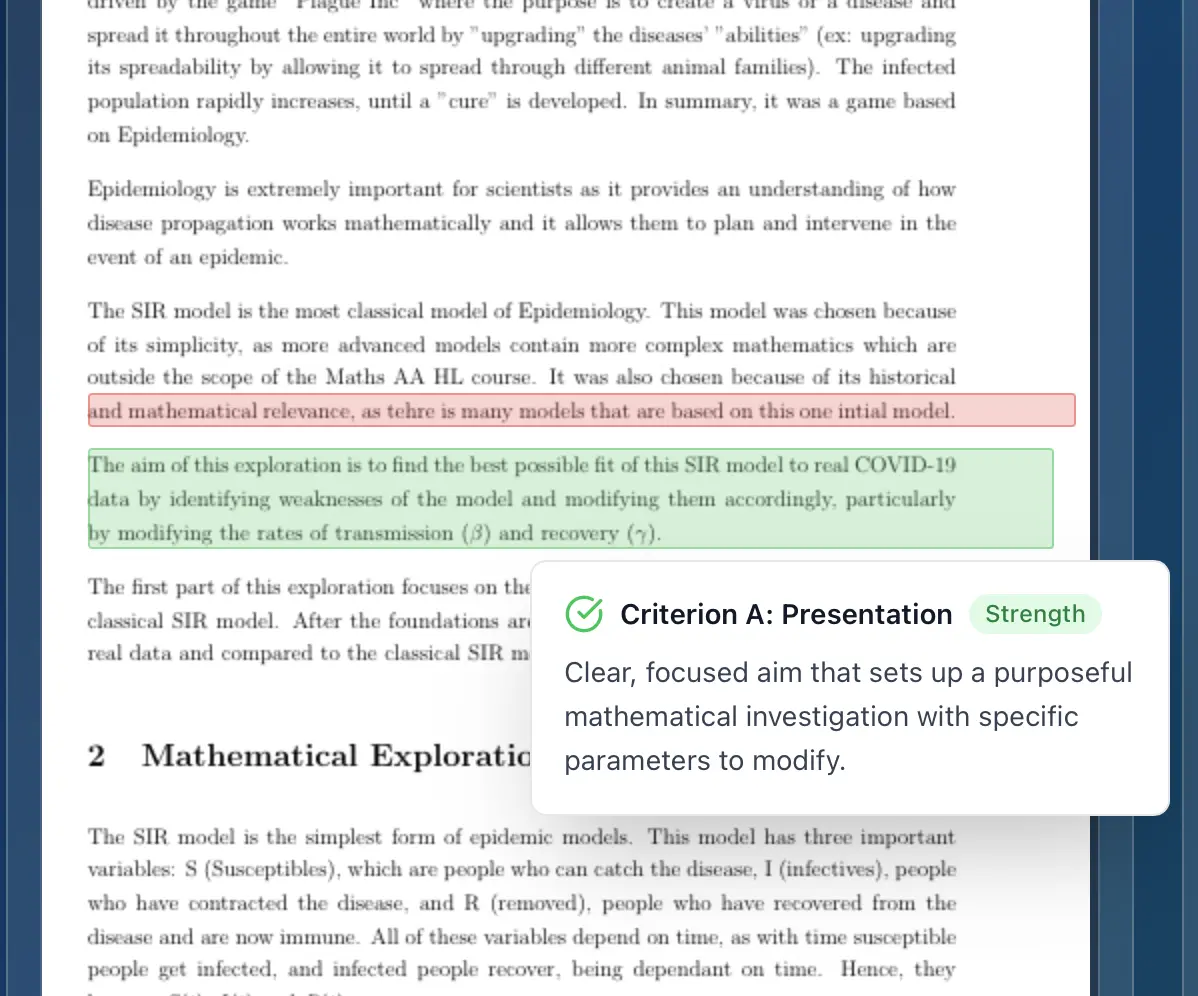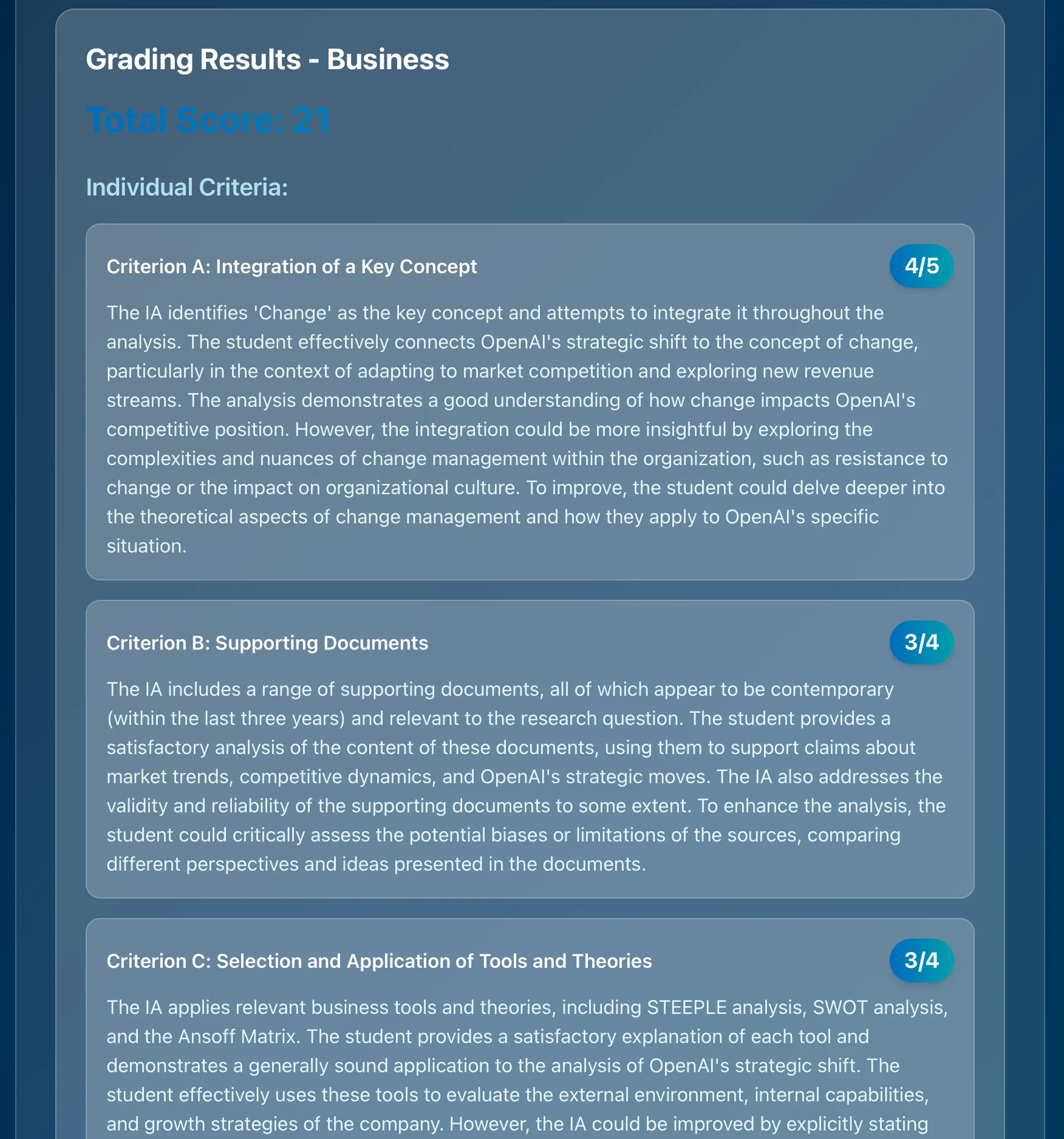How to Study for IB Exams: The Ultimate Revision Guide
Preparing for your IB exams can feel overwhelming, but with the right strategies and resources, you can confidently tackle any challenge. This ultimate revision guide provides a comprehensive roadmap to success, covering everything from effective study techniques to common pitfalls to avoid. We'll delve into proven methods for mastering content, optimizing your exam performance, and even leveraging AI-powered tools like Marksy to enhance your understanding and improve your grades. Whether you're aiming for a perfect 7 or simply striving to pass, this guide will equip you with the knowledge and tools you need to excel in the International Baccalaureate.
Understanding the IB Exam Landscape
Before diving into specific study techniques, it's crucial to understand the overall structure and philosophy of the IB exams. The International Baccalaureate aims to develop well-rounded individuals with strong critical thinking skills. Therefore, the exams assess not only your knowledge of the subject matter but also your ability to apply that knowledge in meaningful ways.
- Different Subject Groups: The IB Diploma Programme (DP) includes six subject groups: Studies in Language and Literature, Language Acquisition, Individuals and Societies, Sciences, Mathematics, and the Arts. Each group offers a variety of subjects at both Standard Level (SL) and Higher Level (HL).
- Internal Assessments (IAs): A significant portion of your final grade comes from Internal Assessments, which are coursework assignments marked by your teachers and externally moderated by the IB.
- External Assessments: These are the final exams you take at the end of the two-year program. They typically consist of a combination of essay questions, short answer questions, and data-based questions, depending on the subject.
Struggling with IB Assessments?
Get instant, detailed feedback on your work with AI that understands IB criteria.

Creating an Effective Study Plan
A well-structured study plan is the cornerstone of successful IB exam preparation. Here's how to create one that works for you:
1. Assess Your Strengths and Weaknesses
Start by identifying your strengths and weaknesses in each subject. Which topics do you find easy to grasp? Which ones consistently trip you up? Use past papers, practice quizzes, and feedback from your teachers to get a clear picture of your current understanding.
2. Set Realistic Goals
Based on your assessment, set realistic goals for each subject. Don't aim for perfection right away. Instead, focus on making steady progress and gradually improving your understanding. Break down large goals into smaller, more manageable tasks. For example, instead of "Master Calculus," aim for "Complete Chapter 3 exercises by Friday."
3. Allocate Time Wisely
Allocate your study time based on the difficulty of the subject and the weight it carries in your overall IB score. Give more time to subjects you find challenging or that have a higher weighting in the final grade calculation.
4. Create a Detailed Schedule
Create a detailed study schedule that outlines what you will study each day and for how long. Be specific and realistic. Include breaks and time for relaxation to avoid burnout. Use a planner, calendar app, or spreadsheet to keep track of your schedule.
Example Schedule:
- Monday: 6:00 PM - 7:30 PM: History HL - Review Chapter 5 and complete practice questions.
- Tuesday: 6:00 PM - 7:30 PM: Biology SL - Revise cell structure and function.
- Wednesday: 6:00 PM - 7:30 PM: Math AA HL - Practice differentiation problems.
- Thursday: 6:00 PM - 7:30 PM: English A Literature HL - Analyze a poem from the syllabus.
- Friday: 6:00 PM - 7:30 PM: Chemistry SL - Review chemical bonding.
- Saturday: Practice Paper Day
- Sunday: Rest and Relaxation
5. Stick to Your Schedule
The key to a successful study plan is consistency. Stick to your schedule as closely as possible, even when you don't feel like studying. Treat your study sessions like appointments and make them a priority.
Effective Study Techniques for IB Exams
Now that you have a study plan in place, let's explore some effective study techniques that can help you master the content and perform well on the exams:
1. Active Recall
Active recall is a powerful technique that involves actively retrieving information from your memory rather than passively rereading notes. Try these active recall methods:
- Flashcards: Create flashcards with questions on one side and answers on the other. Quiz yourself regularly and focus on the cards you struggle with.
- Practice Questions: Solve practice questions from past papers or textbooks. This helps you apply your knowledge and identify areas where you need more practice.
- Teach Someone Else: Explaining concepts to someone else forces you to organize your thoughts and identify any gaps in your understanding.
2. Spaced Repetition
Spaced repetition involves reviewing material at increasing intervals over time. This helps to reinforce your memory and prevent forgetting. Use flashcard apps or create your own spaced repetition schedule.
3. Mind Mapping
Mind mapping is a visual technique that helps you organize and connect ideas. Start with a central topic and branch out with related concepts, keywords, and examples. This can be particularly helpful for subjects like History, Geography, and Biology.
4. Summarization
Summarizing key concepts in your own words is a great way to check your understanding and consolidate your knowledge. Try summarizing each chapter of your textbook or each lecture you attend.
5. Past Paper Practice
Past papers are your best friend when preparing for IB exams. They give you a realistic idea of the exam format, question types, and difficulty level. Solve as many past papers as possible under timed conditions. Analyze your mistakes and learn from them.
Subject-Specific Strategies
While general study techniques are important, it's also crucial to tailor your approach to the specific requirements of each subject. Here are some tips for common IB subjects:
- Mathematics: Focus on understanding the underlying concepts and practicing a wide variety of problems. Pay attention to the command terms used in the questions.
- Sciences: Emphasize understanding the scientific method, experimental design, and data analysis. Practice interpreting graphs and charts.
- Humanities: Develop strong essay writing skills. Practice analyzing sources, constructing arguments, and supporting your claims with evidence.
- Languages: Focus on improving your vocabulary, grammar, and comprehension skills. Practice speaking, writing, reading, and listening in the target language.
Pro Tip: Get AI-Powered Grading
Stop second-guessing your grades. Get instant feedback aligned with official IB rubrics.

Common Challenges and Mistakes
Many IB students face similar challenges during their exam preparation. Here are some common mistakes to avoid:
- Procrastination: Don't wait until the last minute to start studying. Start early and spread out your workload.
- Passive Rereading: Rereading notes without actively engaging with the material is not an effective study technique.
- Ignoring Feedback: Pay attention to the feedback you receive from your teachers on your IAs and practice papers. Use this feedback to identify areas where you need to improve.
- Neglecting Your Well-being: Don't sacrifice sleep, nutrition, and exercise for studying. Taking care of your physical and mental health is essential for optimal performance.
- Not Understanding the IB Rubrics: Familiarize yourself with the IB rubrics for each assessment. Understanding the criteria will help you tailor your work to meet the expectations of the examiners.
Advanced Tips and Strategies
Ready to take your IB exam preparation to the next level? Here are some advanced tips and strategies:
- Use the IB Subject Guides: The official IB subject guides are invaluable resources. They provide detailed information about the syllabus, assessment objectives, and command terms.
- Attend Revision Sessions: Attend revision sessions offered by your school or external tutors. These sessions can provide valuable insights and help you clarify any doubts.
- Form Study Groups: Studying with peers can be a great way to stay motivated and learn from each other. However, make sure your study group is focused and productive.
- Practice Exam Techniques: Learn how to manage your time effectively during the exams. Practice writing clear and concise answers that address the question directly.
- Stay Calm and Confident: Believe in yourself and your abilities. Stay calm and focused during the exams.
Technology and Modern Assessment
Technology is transforming the way we learn and assess knowledge. In the IB, technology plays an increasingly important role in both teaching and assessment. One of the most exciting developments is the use of AI-powered tools to provide personalized feedback and support student learning.
Marksy: Your AI Grading Assistant for IB
Marksy is a leading AI grading assistant specifically designed for the International Baccalaureate. It helps teachers provide instant, accurate, and detailed feedback on student work based on official IB rubrics. This not only saves teachers valuable time but also helps students understand exactly how to improve their work.
How Marksy Works:
- Rubric-Aligned Scoring: Marksy uses official IB rubrics to score student work, ensuring consistency and fairness.
- Detailed Criterion-by-Criterion Feedback: Marksy provides detailed feedback on each criterion, highlighting strengths and weaknesses.
- Suggestions for Improvement: Marksy offers specific suggestions for improvement, helping students understand how to achieve higher marks.
Benefits of Using Marksy:
- For Teachers: Saves time, ensures consistent grading, and provides detailed feedback to students.
- For Students: Provides clear understanding of assessment criteria, identifies areas for improvement, and helps them achieve higher grades.
AI tools like Marksy are revolutionizing IB assessment by providing more efficient, accurate, and personalized feedback. By leveraging these technologies, teachers can focus on providing individualized support to their students, while students can gain a deeper understanding of their strengths and weaknesses.
Conclusion with Clear Next Steps
Preparing for IB exams requires dedication, hard work, and a strategic approach. By following the tips and strategies outlined in this guide, you can significantly improve your chances of success. Remember to create a detailed study plan, use effective study techniques, avoid common mistakes, and leverage technology to enhance your learning.
Next Steps:
- Create Your Study Plan: Use the guidelines in this guide to create a personalized study plan that fits your needs and goals.
- Practice Regularly: Solve past papers and practice questions regularly to reinforce your knowledge and improve your exam techniques.
- Seek Feedback: Ask your teachers for feedback on your work and use it to identify areas where you need to improve.
- Explore Marksy: See how Marksy can help you improve your IB scores or streamline your grading workflow. Try Marksy for free today and experience the power of AI-powered feedback!